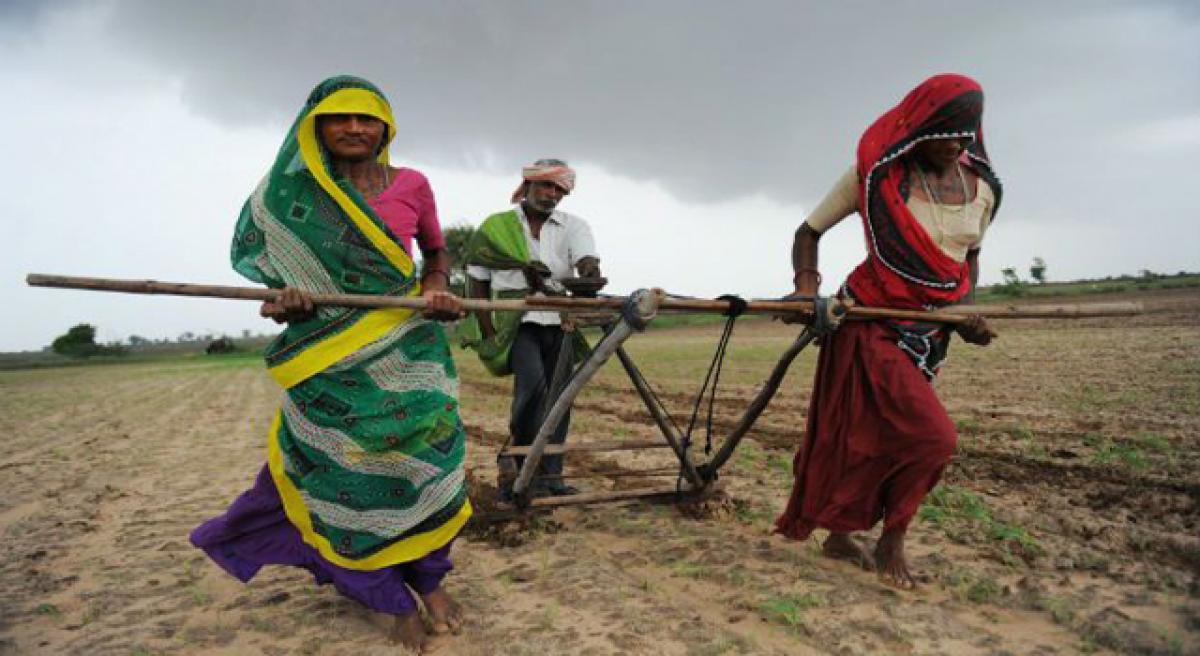Live
- Suriya and Bobby Deol's Kanguva Struggles at Box Office Amidst Criticisms
- Sobhita Dhulipala picks traditional Kanjivaram silk saree for her wedding
- AISF elects new council for Tirupati dist
- Annual Art Festival 2024 by SICA
- Celebrating resilience and strength through literature
- No Telugu Ganga water supply in some wards today
- Press Release - Understanding Men’s Mental Health Challenges FINAL
- International Men’s Day: Make ‘Him’ Feel Truly Special
- Chandrasekhar takes charge as Srisailam temple EO
- Border-Gavaskar Trophy 2024-25: Devdutt Padikkal, Sai Sudarshan back-ups for Indian team for Test matches
Just In

I whole-heartedly commend the Government of India under the leadership of Narendra Modi for its commitment to double the farmer\'s income by the year 2022.
I whole-heartedly commend the Government of India under the leadership of Narendra Modi for its commitment to double the farmer's income by the year 2022.
Farmers in most parts of the country have been going through deep distress. Not a day passes without media carrying reports of farmers committing suicide in one part of the country or the other. Deeply mired in debt and seeing no ray of hope, farmers are resorting to this extreme step in their lives.
Against such a backdrop, the Prime Minister's plan to double farmers' income in the next five years will go a long way in alleviating distress among farmers. Let me take this opportunity to touch upon some of the problems farmers are facing and explain what the Government can do.
To achieve the proposed goal of doubling the farmer's income in five years, the farmer's real incomes have to grow by about 15 per cent per annum. This may be a difficult challenge and not possible with a 4 per cent growth in agriculture.
It could be possible only with getting higher output prices by the farmers as compared to their input prices. Farmers' income can be doubled only if they are enabled to cut down on their costs of production, improve production and productivity, reduce the transaction costs and realize higher prices for their produce.
No doubt, the governments both at the Centre and in States have been implementing a number of schemes to help farmer bring down costs of production. But they have not made any noticeable dent.
Input costs have been skyrocketing year after year while there is no guarantee of higher realizations on agricultural produce. As part of the plan to bring down costs of production, I suggest that the Government of India initiate schemes to promote mechanisation of farming.
The Central Institute of Agricultural Engineering at Bhopal may be directed to organise exhibitions of implements that are scattered in different parts of the country as well as developed by ICAR outfits to motivate the farmers to use them, which will help in slashing costs of production.
Agricultural universities should be made accountable for improving productivity and production in their hinterlands. They should play a pivotal role in transferring knowledge from research labs to fields. The government should appoint a committee of experts to suggest how the National Rural Employment Guarantee Scheme can be dovetailed into farming operations.
After all, the government is spending thousands of crores of rupees every year with the ostensible purpose of providing employment to rural workers and mitigate their distress. It will be a win-win situation if NREGA is linked with agricultural operations that help the farmer cut costs and boost production even as livelihood opportunities are provided to workers.
Under the present dispensation, the annual announcement of minimum support prices for agricultural produce has become a mere ritual. Although MSPs are announced for 24 varieties of crops, only for a few of them there are active nodal agencies to ensure that the farmer gets the MSP.
Fanners in different parts of the country have been forced to make distress sales as they do not have the means or capacity to store the produce and wait for remunerative prices.
I suggest that MSPs be announced for more agricultural products, and they should be linked to the inflation in input costs so that the fanner goes for different crops instead of uni-crop pattern. This enables him to float, if one crop fails, other crops will neutralise that loss.
The government should institute mechanisms like nodal agencies and market stabilisation funds to go to the rescue of the farmer when prices plummet below normal.
Banks have for many years gone to the rescue of capitalists including wilful defaulters under schemes like one-time settlement and corporate debt restructuring.
It is in this context, the demand for loan waivers from the farm sector has to be viewed. Should the government discriminate between industry and the farm sector? The loans given to farmers running into millions all over the country constitute only a fraction of the loans given to industry.
The Union Government also should think of providing some sort of social security like pensions to farmers. With agriculture becoming unremunerative, a large number of small and marginal farmers are migrating to urban areas in search of livelihood.
At least some of them can be assured livelihood in villages if the government unveils a policy to promote the setting up of industrial training institutes at the rate of one for a cluster of villages. They can produce skilled personnel like carpenters, plumbers, electricians, and repairers of electronic and electric gadgets. The shortage of such skilled personnel is more acute in rural areas is than in urban areas.
(Writer is a former MP and an activist; This is a presentation made at the pre-budget meeting of farmers interest group with the Minister of Finance on 5th December 2017)
By Dr Sivaji Yalamanchili

© 2024 Hyderabad Media House Limited/The Hans India. All rights reserved. Powered by hocalwire.com







